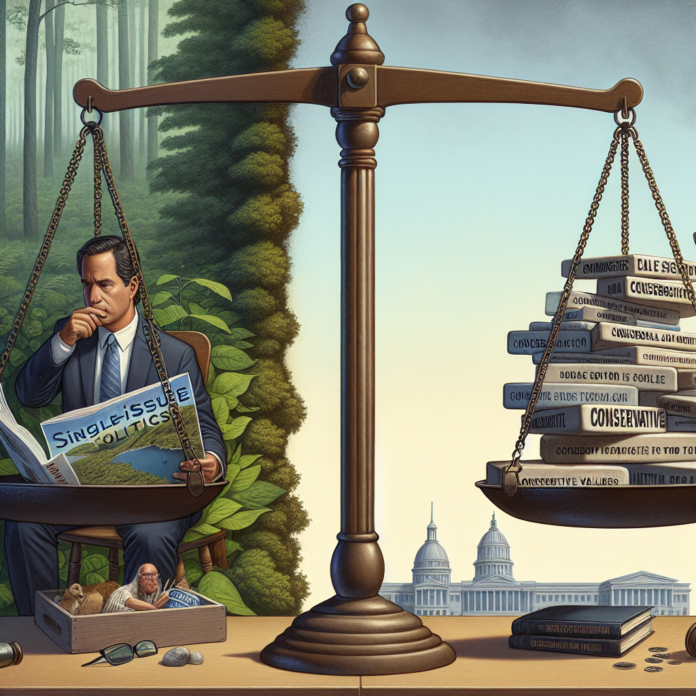Unseen Consequences: The Dangers of Single-Issue Politics for Conservatives
In the labyrinthine corridors of political strategy, single-issue politics often emerge as both a beacon and a blindfold. For conservatives, a reliance on singular issues like abortion, gun rights, or immigration can galvanize a base but also trap them in a quagmire of unintended and often unseen consequences. While these topics are certainly clamorous, they tend to overshadow the nuanced needs of a dynamic and evolving society. Let’s closely examine how this approach not only limits the conservative agenda but also alienates potential allies and fuels division.
Historically, conservatism has been steeply rooted in traditions, many of which date back centuries. The Catholic Church, for example, has been an enduring pillar of conservative thought, focusing on issues like the sanctity of life and the institution of marriage. This singular focus, however, often fails to account for the complex realities of modern existence. An unwavering stance in favor of prohibiting abortion, for instance, may rally fervent support from committed Catholics, but it overlooks the intricate web of socioeconomic factors facing women today. By reducing the conversation surrounding women’s reproductive rights to a simple moral absolute, conservatives risk alienating a significant portion of the electorate who might sympathize with a broader array of policy goals but disagree on this single issue.
Interestingly, one need not look far back in history to see potent examples of single-issue myopia. The colossal defeat of the Republican party in the 1964 U.S. Presidential election serves as a poignant case in point. Senator Barry Goldwater overwhelmingly appealed to voters who staunchly opposed civil rights legislation. His loss, however, revealed a fatal flaw: single-issue politics do not resonate broadly enough to secure electoral victory in a nation increasingly attuned to multifaceted social issues. Despite the impact Goldwater had on the modern conservative movement, his single-minded focus proved to be his electoral undoing.
Fast forward to today, and we see similar mistakes being made. The arresting images of mass shootings have propelled gun rights to the forefront of conservative agendas. While protection of the Second Amendment is a legitimate concern, an inflexible stance on gun control fails to address a nation crying out for sensible regulation. Common ground proposals, like background checks or restrictions on assault weapons, are dismissed outright, closing the door to compromise and thereby alienating moderates. Recent headlines proclaim a harsh reality: as mass shootings become almost commonplace, soaring public demand for change leaves conservatives increasingly seen as out-of-touch defenders of an untenable status quo.
Moreover, immigration has become another polarizing issue where single-issue politics have drastically shaped the conservative movement’s landscape. The notion of "building a wall" became not just a slogan but a litmus test of loyalty within the conservative base. Yet, the implications of such rhetoric are far more profound. Ever since Ronald Reagan’s Immigration Reform and Control Act of 1986, the conservative approach toward immigration has undergone a seismic shift. Rather than acknowledging economic realities and the contributions of immigrants, the contemporary conservative narrative has devolved into a simplistic us-vs-them dichotomy. This has had far-reaching consequences, not least among them being the alienation of Latino voters, a demographic that could very well hold the keys to future elections.
The fixation on single issues also blinds conservatives to the broader implications of their policies. Environmental regulations, long derided by right-wing commentators, are not just about protecting wildlife but about ensuring public health, creating green jobs, and securing a sustainable planet for future generations. As climate change continues to accelerate, the conservative dismissal of environmental concerns as alarmist rhetoric isolates potential voters who care deeply about the planet. According to data from the Pew Research Center, 67% of Americans now view climate change as a major threat. By ignoring this pressing issue, conservatives risk being seen as defenders of an outmoded, irresponsible agenda.
Conspicuously absent in much conservative discourse is any meaningful engagement with the rapidly changing social dynamics regarding LGBTQ rights. The Supreme Court’s decision in Obergefell v. Hodges (2015) to legalize same-sex marriage was landmark, reflecting growing public acceptance of LGBTQ relationships. However, by clinging to traditionalist views espoused by Catholic conservatism, many conservatives find themselves outside the mainstream sentiment, thereby alienating younger generations who overwhelmingly support LGBTQ rights. Data from Gallup indicates that 70% of Americans now support same-sex marriage. The adherence to outdated views alienates an increasingly significant and vocal voter bloc.
Even issues of fiscal conservatism, typically a stronghold for Republicans, suffer from single-issue scrutiny. The preoccupation with tax cuts for the wealthy, epitomized in the Tax Cuts and Jobs Act of 2017, often ignores the broader economic picture. Public investment in education, infrastructure, and healthcare are essential for long-term economic growth and stability. By focusing narrowly on immediate tax relief, conservatives fail to address the systemic inequalities that plague American society, further driving voters toward progressive candidates who promise comprehensive reform.
In conclusion, single-issue politics serve as both the strength and Achilles’ heel of contemporary conservatism. While galvanizing a core base, they narrow the wider appeal necessary for sustained political success. History and current events illustrate the limitations of this strategy, revealing unseen consequences that erode public trust and diminish electoral viability. Convictions rooted in traditionalism, particularly those informed by Catholic conservatism, are often seen as increasingly out of touch with the diversified, modern American electorate. In an era where complex, multifaceted issues define the public agenda, the conservative movement must adapt or risk obsolescence. Progressive values, while also complex and varied, increasingly offer a holistic and adaptive approach that resonates more profoundly with the challenges of our times.
